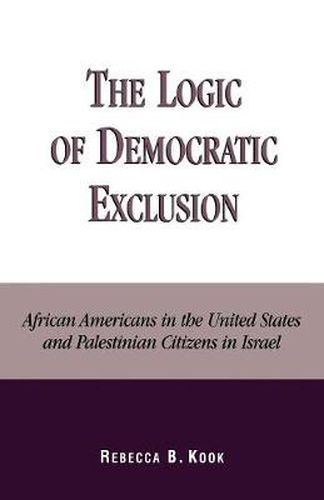Readings Newsletter
Become a Readings Member to make your shopping experience even easier.
Sign in or sign up for free!
You’re not far away from qualifying for FREE standard shipping within Australia
You’ve qualified for FREE standard shipping within Australia
The cart is loading…






The Logic of Democratic Exclusion probes the twilight zone of citizenship and national identity and the minorities - African Americans and Palestinians -who inhabit these margins. In this new work Rebecca Kook investigates the lives of these two groups, minorities included yet severely excluded; citizens of the state yet not entirely members, their identity distinct and excluded from the homogenized and constructed identity of the core. Kook finds that both Palestinians and African Americans are accorded certain rights, yet denied others by two exclusionary democracies: the United States and Israel. Building upon a theoretical framework of democratic exclusion as a tool of public policy, the work uses hitherto unrecognized sources as diverse as festivals and stamps to unravel the logic of democratic identity. It raises serious questions about the robustness of American and Israeli democracy, societies plagued by complex racial and ethnic problems and social, economic and political inequality, and analyzes the ability of states to manipulate boundaries of identity and maintain exclusionary identities while upholding democratic values.
$9.00 standard shipping within Australia
FREE standard shipping within Australia for orders over $100.00
Express & International shipping calculated at checkout
The Logic of Democratic Exclusion probes the twilight zone of citizenship and national identity and the minorities - African Americans and Palestinians -who inhabit these margins. In this new work Rebecca Kook investigates the lives of these two groups, minorities included yet severely excluded; citizens of the state yet not entirely members, their identity distinct and excluded from the homogenized and constructed identity of the core. Kook finds that both Palestinians and African Americans are accorded certain rights, yet denied others by two exclusionary democracies: the United States and Israel. Building upon a theoretical framework of democratic exclusion as a tool of public policy, the work uses hitherto unrecognized sources as diverse as festivals and stamps to unravel the logic of democratic identity. It raises serious questions about the robustness of American and Israeli democracy, societies plagued by complex racial and ethnic problems and social, economic and political inequality, and analyzes the ability of states to manipulate boundaries of identity and maintain exclusionary identities while upholding democratic values.